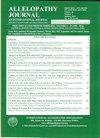Bibliometric Analysis of Allelopathy Journal
Q3 Agricultural and Biological Sciences
引用次数: 0
Abstract
Allelopathy Journal is the official publication of ‘Allelopathy Books’ that promotes allelopathy research and publish researches related to plant sciences and health sciences. This study aimed to present an insight about the researches published in this journal, to help the Authors, Readers and Editorial team to understand the journal in depth. We analyzed the scholarly publications published in the Allelopathy Journal, their Citations, focussing on other aspects such as Publication output, Citation analysis, Co-authorship patterns, Collaboration networks, Research productivity, Research topics and International collaboration. This study is useful to identify emerging trends and evaluate research impact. The data for the study was extracted from the Scopus Database for the period from 1996 to 2022. The results showed that the journal has published 1209 papers during this period, which received 9826 citations with an average of 8.13 citations per paper. F.Z. Wu was the most prolific author with 22 papers receiving 127 citations and Prof. S.S. Narwal, with second highest papers in the journal, received the highest number of citations (242). China was the most productive country with 425 papers in the journal, followed by India (243 papers). The Chinese Academy of Sciences was the most productive institute in the journal and published 67 papers with 678 citations. A total of 4870 authors have appeared in 1209 papers with 0.91 degree of collaboration and a collaboration index of 4.03. Thematic maps indicated that the topics represented by keywords such as "Distribution", "Habitat", "Essential Oil", “Lettuce", "Morphology," have potential importance for future research.化感作用期刊的文献计量学分析
《化感作用杂志》是“化感作用书籍”的官方出版物,旨在促进化感作用研究并发表与植物科学和健康科学相关的研究。本研究旨在深入了解本刊发表的研究成果,帮助作者、读者和编辑团队深入了解本刊。我们分析了《化感病杂志》上发表的学术出版物及其引文,重点关注其他方面,如出版物产出、引文分析、合作模式、合作网络、研究生产力、研究主题和国际合作。这项研究有助于确定新出现的趋势并评估研究的影响。该研究的数据取自Scopus数据库中1996年至2022年期间的数据。结果显示,该杂志在此期间发表了1209篇论文,被引用9826次,平均每篇论文被引用8.13次。吴是最多产的作者,有22篇论文被引用127次,而论文排名第二的纳瓦尔教授被引用次数最多(242次)。中国是产量最高的国家,在该杂志上发表了425篇论文,其次是印度(243篇)。中国科学院是该杂志产量最高的研究所,发表了67篇论文,被引用678次。共有4870位作者发表在1209篇论文中,合作度为0.91,合作指数为4.03。专题地图显示,以“分布”、“生境”、“精油”、“生菜”、“形态学”等关键词为代表的主题对未来的研究具有潜在的重要性。
本文章由计算机程序翻译,如有差异,请以英文原文为准。
求助全文
约1分钟内获得全文
求助全文
来源期刊

Allelopathy Journal
农林科学-农艺学
CiteScore
1.40
自引率
0.00%
发文量
47
审稿时长
18-36 weeks
期刊介绍:
- General Allelopathy
- Chemistry, Organic Chemistry
- Microbes
- Agroforestry, Forestry
- Ecology, Biodiversity, Invasive Organisms
- Plant Insects pests: Entomology
- Agronomy, Cropping Systems, Weeds Management
- Fresh water biology, Aquatic Ecosytems, Limnology
- Plant Pathogens
- Biochemistry
- Genetics, Plant Breeding
- Soil Science, Soil Sickness
- Biotechnology, Molecular Biology
- Horticulture
- Vegetable Crops
- Botany, Plant Physiology
- Limnology
- Zoology
 求助内容:
求助内容: 应助结果提醒方式:
应助结果提醒方式:


